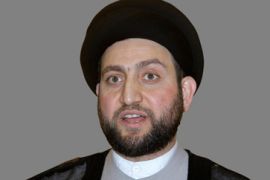‘PM should be acceptable to all’
INA’s Ammar Hakim says alliance with al-Maliki’s State of Law may be imminent.

 |
| Despite winning the most seats in Iraq’s March 7 national elections, Allawi’s chances of forming a parliamentary majority to head the next government are getting slimmer [Reuters] |
It has been more than a month since Iraqiya, the secularist coalition headed by Iyad Allawi, won 91 out of the Iraqi parliament’s 325 seats, edging out the State of Law coalition of Nouri al-Maliki, the incumbent prime minister, by just two seats.
However, no party has gained enough seats to rule over the country on its own, making a national alliance a must for an effective government to exist.
In the past few days, representatives from the State of Law coalition have been negotiating with leaders of the mainly Shia Iraqi National Alliance (INA) – which won 70 seats in the election – to combine forces and cobble together the needed majority to shut Allawi out of power.
For his part, Jalal Talabani, the Iraqi president, has said the Kurdish alliance might join the country’s main Shia bloc if they unite to form the next government.
Ammar Hakim, head of the Islamic Supreme Council (ISC), which is part of the the INA, told Al Jazeera in an interview, that the INA and State of Law may announce an alliance in the next few days.
Below are excerpts from that interview.
Al Jazeera: When should we expect the announcement of the merger?
Ammar Hakim: Concerning an alliance between the State of Law Coalition and the INA, we have made a lot of progress in our talks, but some details still need to be worked out.
I am speaking on behalf of the ISC and the Sadr movement, which is part of the INA.
Did you agree on the choice of prime minister – something that has been a major sticking point between the political parties?
|
|
Before discussing the name of the prime minister, we need to define the criteria on which we will make our choice.
We will chose the prime minister based on the qualifications we are looking for or we will nominate a number of candidates and parliament will choose.
The prime minister will be the prime minister of Iraq – he should be accepted by all and he also needs to deal with our regional neighbours. He cannot be a person who provokes the region and the people.
Is that a veiled reference to al-Maliki?
I don’t want to discuss names. We must concentrate on the qualifications of the person
Is their a veto on al-Maliki? The Sadrists – your allies – have made clear through their unofficial referendum that they don’t want al-Maliki back in power.
The Sadrists have their own position. Muqtada al-Sadr has reservations about al-Maliki due to past experiences and we hear similar reservations from other parties in Iraq.
Reservations are one thing but finding guarantees to deal with these reservations is another so that we won’t make the same mistakes as in the past.
Allawi has warned of consequences if a major party is excluded from government. But if the Shia blocs unite, it will be the same political landscape of the past four years and reconciliation will not be achieved?
First, I don’t accept the way some people call it a Shia government. We want an Iraqi government that includes all parties.
Iraqiya made a strong showing in the elections and they had a lot of support from our Sunni brothers, who have a lot of influence in this country. We in the INA have made it clear we won’t accept a government that excludes a main party.
What kind of participation will the Iraqiya list have in the next government?
We are not talking about any kind of participation but one that will allow them to make decisions.
Do you think Allawi’s chances of becoming prime minister are now slimmer?
I cannot say if Allawi’s chances of becoming prime minister are slim. The issue will depend on the negotiations and alliances that are formed.
But the Kurdish alliance expressed some concern about some on the list of Iraqiya and others also expressed concern. This will depend on the types of alliances formed.